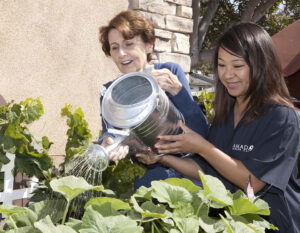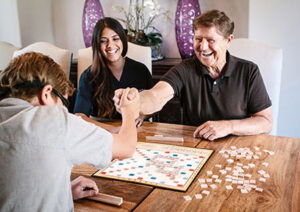We’ve entered the month of love, as it’s commonly advertised. Yet, February shouldn’t be only about romantic love. Whether you’re a younger person, an older adult or a senior aged 65-plus, February provides an opportunity to better understand the value of friendship and companionship for mental and physical health.
Numerous studies have shown that the value of companionship cannot be understated, particularly when considering the well-being of seniors. AARP points to one study that found that “even momentary social interactions with friends reduce fatigue and stress” in older adults. Researchers have documented that seniors involved in friendships later in life have been able to stave off symptoms of Alzheimer’s and dementia and slow down physical decline.
At Amada Senior Care, we truly understand the power and potential of companionship in enhancing the lives of the aging-in-place seniors we serve. Our trained caregivers help support senior clients with everyday tasks as an essential part of their role, but they also serve as care companions who provide a watchful eye and an empathetic ear. Compassionate and committed, members of the Amada caregiver team understand how companionship provides solace, comfort and joy, while positively impacting a senior’s well-being.
The Positive Impacts of Senior Companionship
Companionship – the human connection – carries an immense influence on the overall health and well-being of older people. There’s increasing scientific evidence to suggest that companionship can aid in reducing the risk of depression, a condition that is common in seniors due to isolation and loneliness.
Having regular, meaningful social interaction helps seniors stay mentally engaged and provides a buffer against cognitive decline. According to a study in the American Journal of Public Health, seniors who maintain robust social interactions have a slower rate of cognitive decline than their less-social peers.
Moreover, social interaction encourages physical activity, which is critical in maintaining overall health. Even basic activities such as walking in the park or playing board games stimulate mental and physical vitality.
As we enter our senior years, companionship becomes an essential part of leading a fulfilling and enjoyable life. Yet, building and maintaining relationships can be challenging, especially for “solo agers,” widows/widowers and seniors experiencing a smaller social circle as friends move or pass away. Here are six practical tips to help you build companionship during your senior years.
-
Join a senior center or active community group
Participate in activities, classes and events specifically designed for seniors through local senior centers, recreational centers, or community groups. By involving yourself in these activities, you can meet like-minded individuals who share your interests and hobbies. These groups can also provide structure and motivation to pursue new experiences in a supportive environment. A senior center, coffeehouse, gym, library, or similar location where people gather provides a “third place” for promoting the exchange of ideas and build relationships.
-
Engage in hobbies and interests
Explore your interests, passions and hobbies by joining clubs or taking classes. Pursuing your hobbies and interests with others not only provides social opportunities but also promotes a sense of achievement and satisfaction. Participating in group activities can help you create connections and form friendships based on common interests.
-
Utilize technology to stay connected
Stay connected with family, friends and peers through various online platforms like video calls, messaging apps and social media. Using technology can help you maintain long-distance relationships and overcome physical limitations that might make in-person communication challenging. Having regular virtual meetings or sharing updates on social media can nurture connections and help you stay engaged with others.
-
Serve as a senior volunteer in your community
Offer your time, skills and knowledge to local organizations, charities, or community projects that interest you. Volunteering allows you to contribute to your community, develop new skills and create purposeful connections with others. It can also foster a sense of fulfillment and gratification while providing a platform to make new friends.
-
Encourage intergenerational relationships
Foster relationships with younger generations by engaging with community members, neighbors, or family. Intergenerational relationships provide valuable learning experiences and allow for mutual appreciation of each generation’s unique attributes. These bonds can challenge age-related stereotypes, reduce isolation and promote understanding across generations.
-
Stay proactive in nurturing friendships
Regularly reach out to friends, family and acquaintances to stay connected and engaged. Taking the initiative to maintain relationships can be crucial in your senior years. Making an effort to stay in touch shows others that you value their companionship and can encourage reciprocation. This approach can help strengthen existing bonds and ensure a support network in times of need.
The Transformative Power of Senior Companionship
Human connection – companionship – plays a crucial role in uplifting mental, physical and emotional health in seniors. Let’s pledge that during this month of love and friendship to focus on fostering wholesome companionship for healthy senior aging – because everyone deserves to enjoy their golden years enveloped in the warmth of friendship and camaraderie. If you’d like to explore the positive impact that caregiver companionship can have for a senior aging in place, we invite you to reach out and speak to an Amada Senior Care advisor. CLICK HERE to find an Amada office near you.
“Embracing Companionship to Enhance Senior Well-Being,” edited by Michelle Flores, Amada blog contributor.















